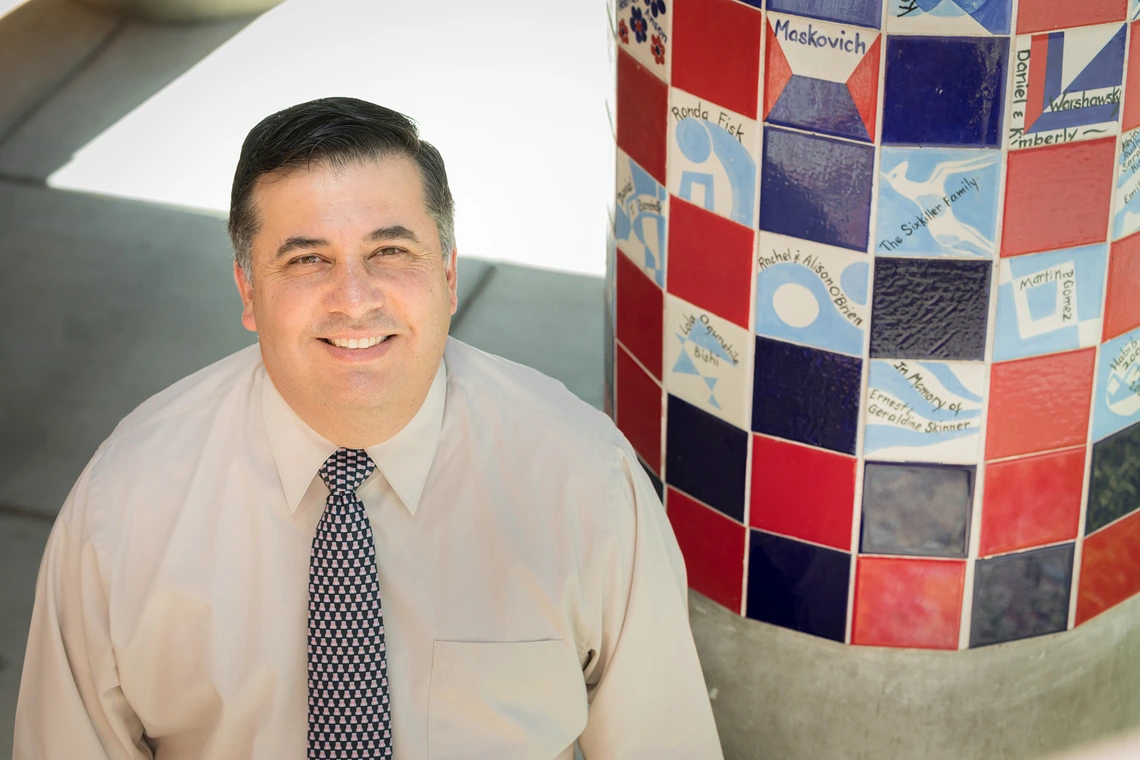The Native American Advancement and Tribal Engagement office advances collaborative efforts with the 22 Tribal Nations in Arizona and across the country.

Chris Richards
Nathan Levi Esquerra joined the University of Arizona as the first Senior Vice President for Native American Advancement and Tribal Engagement, NAATE, on September 8, 2020. SVP Esquerra's experience in economic development and Native American tribal relations, and as a former tribal chairman of the Chemehuevi Indian Tribe has been critical to positioning NAATE at the core of the University's collaborations to improve and sustain essential services to tribal communities and Native students, faculty, staff, and graduates.
"Our goal," said SVP Esquerra, "is to establish UArizona as the leading institution serving Native Nations. We currently have the highest Native American graduation rates among doctorate candidates. However, we feel there is much more we can do to increase retention and graduation rates, contribute, and help build thriving, self-sufficient, tribal communities and economies." Photo: Chris Richards
Under SVP Esquerra's lead, the University has strengthened its relationship with representatives of the 22 federally recognized tribes in Arizona, contributing, among other endeavors, to the signing of Inter-Governmental Agreements and Memoranda of Understandings. After conversations between the University and representatives from the Pascua Yaqui tribe started in 2019 and stalled, SVP Esquerra restarted and advanced the negotiations. In May 2021, both parties finalized the IGA, and the official signing ceremony took place on August 3, 2021. In less than a year, the NAATE Office moved this IGA from draft to completion and now to implementation. The University is currently collaborating to create and finalize a Micro-Campus on the Pascua Yaqui Tribe reservation.
SVP Esquerra pointed out that President Robbins's support has been critical in advancing all NAATE efforts, including establishing the Tribal Leaders Advisory Council. The Advisory Council, composed of tribal representatives, advises President Robbins on important tribal matters that pertain to UArizona Native American students, faculty, and community. The first Advisory Council meeting took place on January 13, 2022. The Advisory Council was a direct outcome of the UArizona Tribal Leaders Summit, convened by the NAATE office and held in October 2021. It was the first of what SVP Esquerra intends to be an annual event with Indigenous leaders. The 2021 Tribal Summit brought together ten Tribes, including eight from Arizona, one from Washington state, and one from Oklahoma.
Another initiative led by the NAATE office and the UArizona Department of Linguistics is the Native American Translation Signage Project. The project aims to change the linguistic landscape on campus by reinforcing and educating students about Arizona's diversity and variety of Native Communities, cultures, and languages. The first deed translated the communications building sign into the Tohono O'odham language. President Robbins and Vice Chairwoman Wavalene Saunders of the Tohono O'odham Nation unveiled the signage on February 21, 2022 --International Mother Language Day. As part of the project, each year, on International Mother Language Day, NAATE and the Department of Linguistics will post temporary signage on campus buildings that describe the purpose of the building in Native languages.
Given that UArizona sits on Indigenous peoples' traditional lands, SVP Esquerra, a member of the Chemehuevi Indian Tribe of California, considered it imperative to acknowledge this respectfully. He attended eleven tribal council meetings between the Pascua Yaqui Tribe and the Tohono O'odham Nation to finalize the land acknowledgment. Then, before its adoption on July 6, 2021, NAATE presented the land acknowledgment statement to Native American Faculty members at the University for their review. "It was a genuinely collaborative effort," noted SVP Esquerra, "and it is gratifying to see other institutions in the Tucson area use the University's statement to develop their own land acknowledgment statements."
SVP Esquerra and NAATE Executive Associate Jacquelyn Valenzuela have attended several events, including the 2022 Indian Nations and Tribes Legislative Day in Phoenix on January 12, where they met with tribal representatives and scheduled visits to the University campus and to the Tribal Communities. So far, President Robbins and SVP Esquerra have met with Honorable Chairman Miguel of Ak-Chin Indian Community and Madam Chairwoman Flores of the Colorado River Indian Tribes. President Robbins and SVP Esquerra also will visit Navajo Nation on June 8, 2022, where they will meet with Honorable President Nez. In addition, a meeting between President Robbins and Honorable Chairman Nuvangyaoma of the Hopi Tribe will take place on campus on April 11, 2022.
In another effort devised by NAATE, President Robbins met with students and representatives from Fort McDowell Yavapai Nation, Chemehuevi Indian Tribe, Colorado River Indian Tribes, and the Hopi Tribe to discuss how COVID has impacted their educational experience both on campus and back at home, and to identify solutions to their challenges. Other initiatives led by the NAATE office include providing PPEs to the tribes, procuring federal and state funding, and supporting research conducted on behalf of tribes.
"The Native American Advancement and Tribal Engagement Office had made tremendous progress in developing strong business relationships with the tribes located in Arizona," stated SVP Esquerra. "We are eager to keep collaborating with the Tribes, and we recognize that this takes time and trust. I have expressed to President Robbins that to work with Tribes, we need to have patience, and from patience comes respect, and from respect comes trust. President Robbins understands this, and that is critical for tribal leaders."
Looking into the future, SVP Esquerra is eager to continue working with tribes to
- Increase enrollment and retention of Native American Students
- Increase STEM Native American Faculty and assist departments with onboarding costs
- Support the work of the Indigenous Resilience Center, aiming to foster collaborations with UArizona researchers, faculty, and staff working on matters relevant to Native resilience
- Partner with Arizona Global to establish micro-campuses on tribes across the nation and globally, and launch the UArizona School of Indigenous Governance and Development
- Establish partnerships with federal agencies that work and support tribes
- Build a Cultural/Learning Center, and
- Build the Sovereignty Plaza
